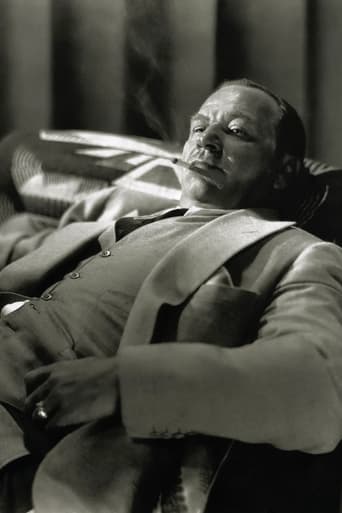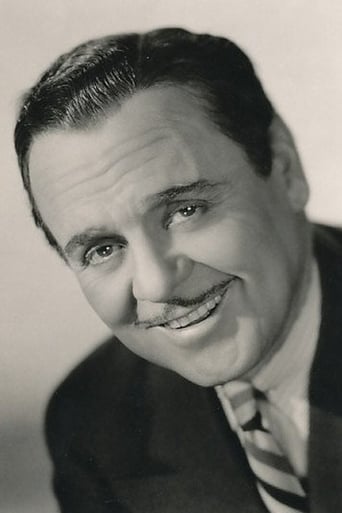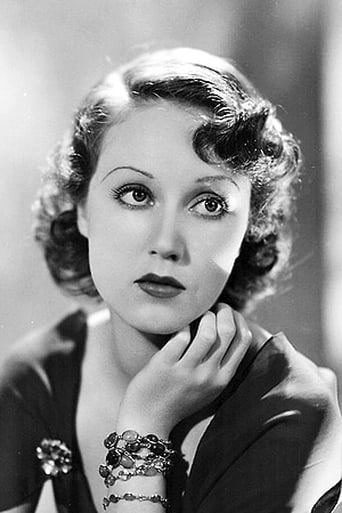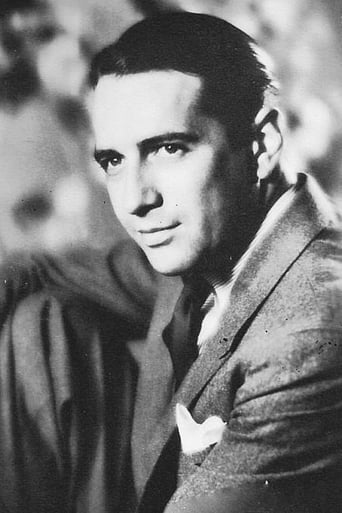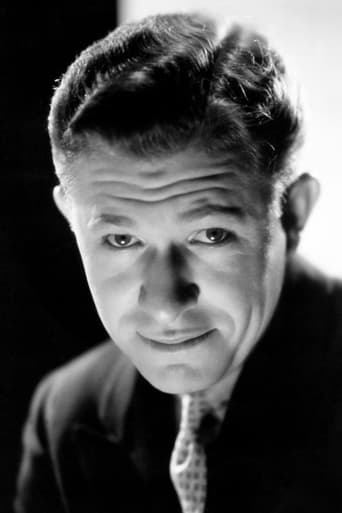Scanialara
You won't be disappointed!
Mjeteconer
Just perfect...
Moustroll
Good movie but grossly overrated
Logan
By the time the dramatic fireworks start popping off, each one feels earned.
JohnHowardReid
Copyright 21 April 1934 by Metro-Goldwyn-Mayer Corp. New York opening at the Criterion, 10 April 1934. London opening at the Empire, 3 May 1934. U.K release: 29 September 1934. 12 reels. 10,284 feet. 114 minutes. SYNOPSIS: Pancho Villa from boyhood to death. NOTES: Academy Award, Assistant Director, John Waters only (defeating Scott Beal for Imitation of Life and Cullen Tate for Cleopatra). Also nominated for Best Picture (It Happened One Night), Writing Adaptation (It Happened One Night), Sound Recording (One Night of Love). Wallace Beery, Best Actor, Venice Film Festival Award. 7th in the Film Daily annual poll of U.S. film critics. Photographed on location in Mexico. About half the movie was originally directed by Howard Hawks. Shooting commenced 10 October 1933. Lee Tracy had the role of Johnny Sykes but was fired from the project when he was arrested by the Mexican police on 19 November 1933 for urinating from his hotel balcony on to a parade of Mexican soldiers. Hawks was fired in late November when he refused to testify against Tracy. It is alleged that a great deal of Hawks footage was destroyed in a plane crash. Hawks himself claimed that most of the location material is his, except for all the exterior battle sequences which were directed by Richard and Arthur Rosson (and photographed by Charles G. Clarke). Conway kept Wong Howe on as photographer when he took over. Shooting was completed on 12 January 1934. Negative cost: $1,022,000. Initial domestic rental gross: $1,109,000. According to Ronald Haver in his splendidly produced and researched David O. Selznick's Hollywood (Knopf, New York, 1980), there is little Hawks' material in the final movie. "Conway began filming from scratch and a 2nd unit in Mexico under the direction of Richard Rosson continued working all through the winter right into March 1934." The leading lady in the Hawks version was Mona Maris. She was replaced by Fay Wray.COMMENT: "Fiction woven from truth," so a Foreword tells us. But this sprawling, not uninteresting account of the rise and fall of Pancho Villa could be described as the reverse of that laudable aim. It is truth woven from a fiction that simplifies, romanticizes, augments and so far distorts basic facts that only their conclusions can be recognized as truths.Difficult as it is to separate fact from fiction in Viva Villa, it's even harder to quantify its value as entertainment. The picture seems to be a composite made up of elements that tend to undermine dramatic unity. We are never sure whether we should regard Villa as bandit or patriot, monster or saint, butcher or clown; whether we should like him, hate him, admire or loathe him. The script takes a long time to make up its mind, but just as it finally settles on "loathe", it suddenly switches sides again and fades out on "admire". These peregrinations don't worry Beery a jot. He plays the character on the same wheedling but brutish level throughout, except in his scenes with Madero when he adopts a childishly insincere posture of hero worship that actually undermines the script. But Beery's myopic performance is just one of many factors that work against the film's success. The chief and most persistent flaw comes down to the dreadful miscasting of second-rate substitute, Stuart Erwin, who tries without the slightest hope in the world to fill the abrasively caustic shoes of Lee Tracy. Erwin turns the reporter into a charmless, cowardly milksop of a whinger. Tracy played the same lines as a compellingly obnoxious scoop-at-any-price newshound right from the start. When the script requires Erwin to be really nasty, he comes a real cropper. We long for a stray bullet to gun him down. But, no! He's still hanging in there, snowing away, right to the bitter end. I didn't take to Leo Carillo's far-too-casual study of the hideously sadistic Diego either, but at least he did suppress most of his usual irritatingly over-the-top mannerisms. Donald Cook, not unexpectedly, erred in the opposite direction, by effortlessly contriving to drain his characterization of any color and make his portrait stiff as a board. Fortunately, there were four main players who really impressed. Fay Wray provided a persuasive account of an aristocratic beauty whose emotions ran hot, then cold. Joseph Schildkraut definitely made his presence felt as the ruthless General Pascal. Henry B. Walthall shone in all his scenes except the last (where it was obvious by the sudden change in lighting that a different photographer and director were at work). And Katherine De Mille (doubtless copying her dad, Cecil B.) certainly looked and acted the part of the imperious Rosa. While I didn't appreciate the film's sudden changes of mood or its jerky continuity (made even more conspicuous by the indiscriminate use of inter-titles), I particularly hated the frequent attempts at comedy relief, all of which fell jarringly flat. On the whole, the studio scenes were less impressive than the location-shot material. Many of the Mexican vistas of crowds and horsemen were shot with artistry and flair. They were truly staggering. Only occasionally were these exterior shots matched by an equal eye for drama in the studio-shot sequences. (One that springs to mind is an effectively long tracking shot that follows Madero as he leaves a crowded ballroom for the solitude of his office). The present patchwork quilt of a movie leaves me in no doubt that if its original conception had been followed, Viva Villa would have emerged as a creditable achievement. As it is, whilst not fatally flawed, it certainly ranks as a disappointment.
evanston_dad
A not very engaging biography of Mexican revolutionary Pancho Villa, who as portrayed in this movie was a hero of the Mexican people and liberated them from the tyranny of government oppression.Really, the movie exists as a star vehicle for Wallace Beery, and he plays Villa the same way he played every character, as a sloppy, lovable lunkhead. The film rather humorously and without irony asks us to adore Villa even while portraying him as a sadistic, violent outlaw, as if it's not even aware that it's providing such an unsavory portrait of its main character. The film's rather dull over all, and even though I know it was a convention of the time, it's tough to tolerate actors like Joseph Schildkraut and Fay Wray made up in dark makeup to play Mexicans. And don't even get me started on the accents, which sound like they should be coming from anyone in the world other than people who actually were born and lived in Mexico.This film received four Academy Award nominations in 1934 but won only one of them, that for Best Assistant Director (John Waters, no not THAT John Waters). The other three nominations were for Outstanding Production, Best Writing (Adaptation), , and Best Sound Recording.Grade: C
ilbarone139
Why did they NOT follow utilizing Gilbert Roland as Villa. Many motion pictures used English & American actors to Portray Germans, Chinese, Mexican & Italians; this has to be one of biggest mistakes; especially with Gilbert Roland whom is a Better Actor than Beery and is Mexican.. Every Movie/T.V. Gilbert was in even in minor roles He stole the Movie. His actions are Unique and done without hesitation.. His Many actions, (Not unlike G.Raft flipping a coin), are very memorable and are his alone. He always incorporated into his acting Kissing his Mothers' ring he sometime wore as Necklace.. The inscription is MEMORABLE; Last words dying Mom said to Him...The movie itself filming appeared numerous stock footage. Joseph Schildkraut, German Born another good actor portrayed General Pascal with conceivable accent, whom Took Over and then murdered Madero (Fictional), Fay Wray had small part and was Good. Ironically better role although was expanded later in her King Kong Venture. Her Character's husband Don Phillpe portrayed by Donald Cook whom has a striking resemblance to Great Character actor Victory Jory whom later delivered the coup de grace. I preferred the subsequent picture whereby Gilbert Roland portrayed another general whom aided Villa in the revolution also staring Rory Calhoun, and Shelley Winters.. Now last NOT lease the Wonderful scene stealing Leo Carrillo, later renown as Pancho, Cisco Kids companion, which ran number of years and Carrillo started them at age seventy. Not only True Mexican he and his Paternal family are Mexican Aristocrats and owned Land Grants which is substantially California today. His Father was Police Chief and Mayor of Los Angeles..Unfortunately this film did Not make box office receipts beyond its' budget and these were days prior to Video sales and foreign distribution. Even though much fiction and have viewed it several times including this morning on TCM. You will enjoy.
Spondonman
Viva Villa!, and its bookend film Treasure Island made just afterwards by Wallace Beery are two of my favourite fiction films from the Golden Age of Hollywood action and adventure. Both are tour-de-force performances by the inimitable Beery, and although chockful of thrills and spills the main entertainment value lies in Beery's screen persona.Story purports to relate the meteoric rise and eventual sideways move of Pancho Villa, Mexican rebel, patriot, murdering raping thug in his quest to give the land back to the peons which had been violently taken from them years before by the arrogant aristocracy. He has a childlike trust in Madero the benign statesman who is almost deified by the movie, and has constant assistance from Sierra played by Leo Carillo, his psychotic sidekick. Fay Wray got a couple of appearances in but some of her scenes were apparently cut when the Hays Code came into force. Based on fact and fiction it's an entertaining ride - yet another Revolution Betrayed, episodic because of production problems they had but always engrossing if you can get over the technical limitations (mainly dodgy back projection).But it's Beery's performance that's so breath-taking: as a real-life dislikable person he successfully plays a thoroughly dislikable swine (and in Treasure Island, too) as a lovable overgrown simple child, except he'd like to try pulling the legs off soldiers instead. You root for him all the way throughout his murderous career, go misty eyed when he does, agree with every cause of his anger. The pathos he introduces at various points in the tale is indescribable and unique – and it's made clear that everyone loves him, except for Fay Wray's character and her brother played by that marvellous wooden actor Don Cook. Some favourite bits: defending his savage tactics to Madero: "You can't win a revolution with Love, you've got to have Hate"; letting embedded journalist Johnny have his way and deciding on a whim to take Santa Rosalia; the telegram from Pancho to Madero stating "nobody killed much" in taking Juarez; Johnny's summation to Pancho "you're better than News, you're History"; Pancho's tearful last orders to his troops; telling a disgusted Cook "Alright. The poor always was the Beast. Only this time we're not frightened"; the thought of the method of execution of General Pasquale; being fed his dying words "Forgive me? Johnny…what I done wrong?", childlike to the end and playing on your heartstrings to a stirring musical score; so many more.The subject history is a bit sketchy so if for no other reason watch this for Beery - to my mind this and Treasure Island are his best performances - not a great actor but in here he's wondrous to behold. The power of film is frightening.
